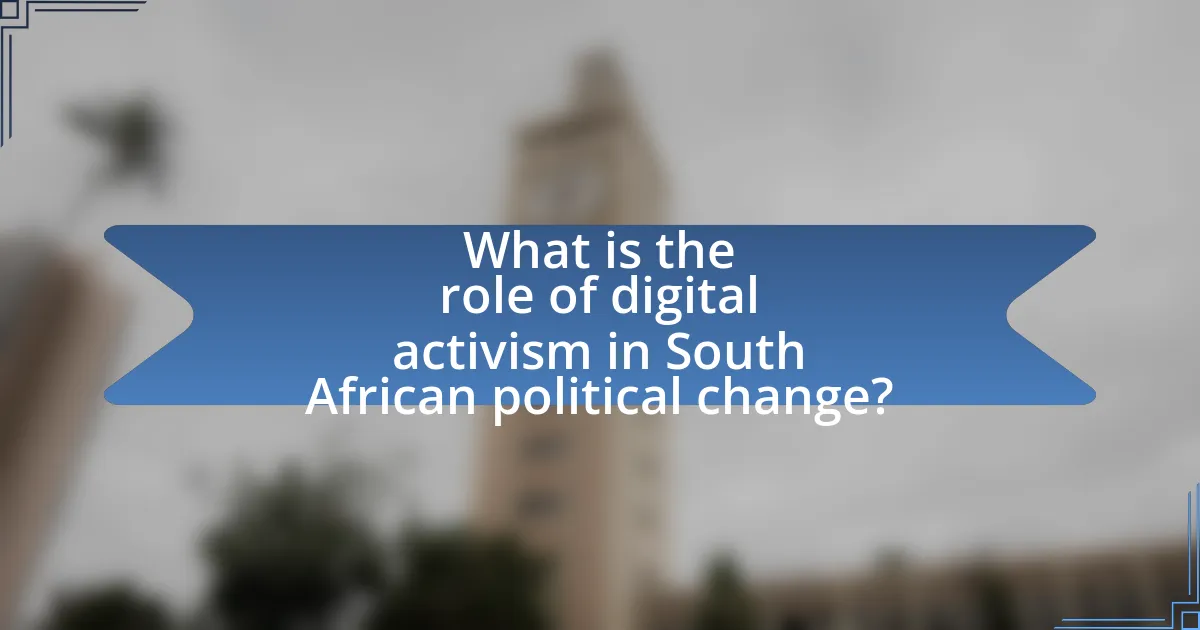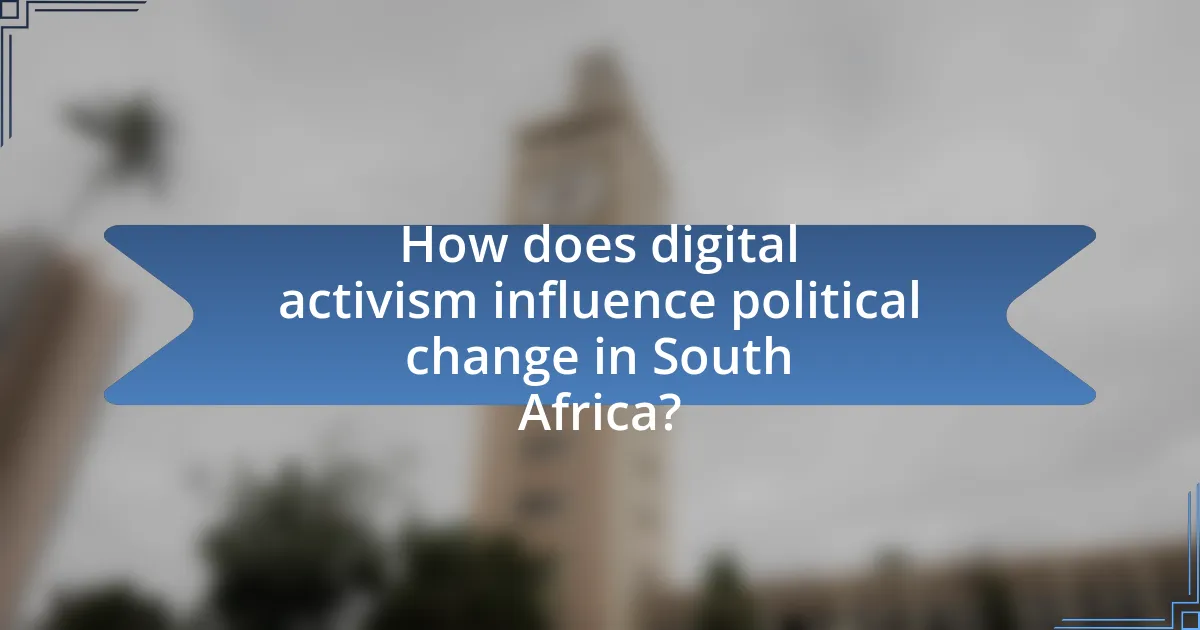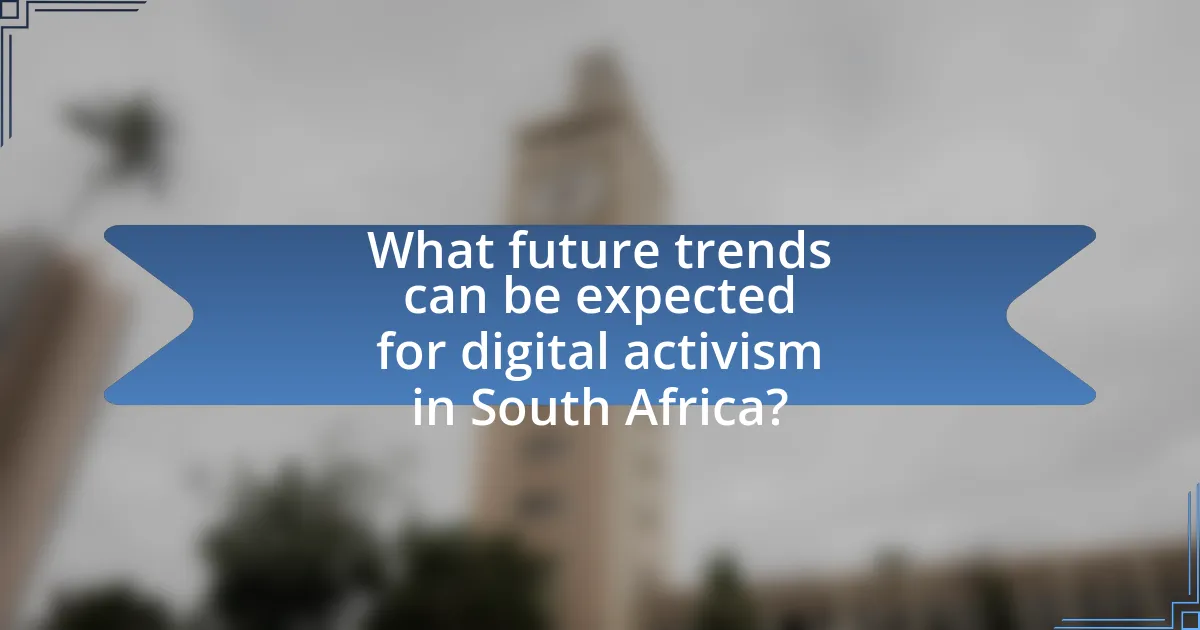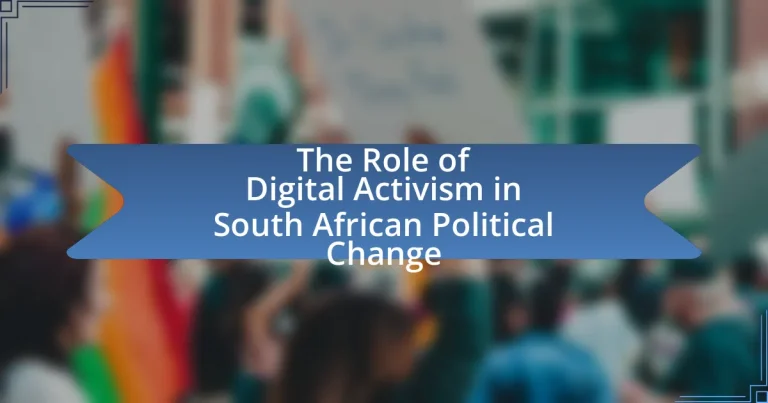Digital activism is a pivotal force in driving political change in South Africa, significantly influencing movements such as #FeesMustFall and #RhodesMustFall. This article examines the evolution of digital activism, highlighting its role in mobilizing citizens, raising awareness, and shaping policy through social media and online platforms. It discusses the historical context that has shaped digital activism, the impact of technological advancements, and the challenges activists face, including government censorship and misinformation. Additionally, the article explores best practices for effective engagement and the future trends that may further enhance digital activism in addressing emerging social issues.

What is the role of digital activism in South African political change?
Digital activism plays a crucial role in South African political change by mobilizing citizens, raising awareness, and influencing policy through online platforms. This form of activism has been instrumental in movements such as #FeesMustFall and #RhodesMustFall, which addressed issues like educational reform and colonial legacies in institutions. The use of social media has enabled rapid dissemination of information, allowing activists to organize protests and campaigns effectively, as evidenced by the significant student mobilization in 2015 that led to policy changes regarding tuition fees. Furthermore, digital activism has facilitated greater participation in political discourse, empowering marginalized voices and fostering a more inclusive political landscape.
How has digital activism evolved in South Africa?
Digital activism in South Africa has evolved significantly from early social media campaigns to sophisticated online movements that influence political discourse. Initially, platforms like Facebook and Twitter were used to mobilize protests against issues such as apartheid and corruption, exemplified by the #FeesMustFall movement in 2015, which addressed rising tuition fees and gained national attention. Over time, digital activism has integrated advanced technologies, including data analytics and targeted messaging, to enhance engagement and reach. The rise of mobile internet access has further democratized participation, allowing diverse voices to contribute to national conversations. This evolution is evidenced by the increasing use of hashtags and viral campaigns that shape public opinion and policy, demonstrating the growing impact of digital platforms on South Africa’s political landscape.
What historical events have influenced digital activism in South Africa?
Historical events that have influenced digital activism in South Africa include the end of apartheid in 1994, the rise of social media in the 2000s, and significant protests such as the Fees Must Fall movement in 2015. The end of apartheid marked a transition to democracy, enabling greater freedom of expression and the use of digital platforms for activism. The proliferation of social media allowed activists to mobilize quickly and share information widely, exemplified by the Fees Must Fall movement, which utilized platforms like Twitter and Facebook to organize protests against rising tuition fees. These events collectively shaped the landscape of digital activism in South Africa, demonstrating the power of technology in facilitating political change.
How have technological advancements impacted digital activism?
Technological advancements have significantly enhanced digital activism by increasing accessibility, facilitating communication, and amplifying reach. The proliferation of smartphones and social media platforms has enabled activists to mobilize support quickly and efficiently, as seen during the #FeesMustFall movement in South Africa, where students utilized Twitter and Facebook to organize protests and share information in real-time. Additionally, data from the Pew Research Center indicates that 69% of South Africans use social media, providing a vast audience for digital campaigns. These advancements have transformed traditional activism, allowing for greater participation and engagement, ultimately influencing political change in the region.
What are the key platforms used for digital activism in South Africa?
The key platforms used for digital activism in South Africa include social media networks such as Twitter, Facebook, and Instagram, as well as messaging apps like WhatsApp. These platforms facilitate the rapid dissemination of information and mobilization of supporters for various social and political causes. For instance, the #FeesMustFall movement, which protested against rising university fees, effectively utilized Twitter to organize protests and share updates, demonstrating the power of these digital tools in influencing political discourse and action in South Africa.
Which social media platforms are most effective for activism?
Twitter and Facebook are the most effective social media platforms for activism. Twitter’s real-time communication and hashtag functionality allow for rapid dissemination of information and mobilization of supporters, as evidenced by movements like #FeesMustFall in South Africa, which gained significant traction through tweets and retweets. Facebook’s extensive user base and group features facilitate community building and event organization, making it a powerful tool for grassroots activism, as seen in various campaigns advocating for social justice and political reform in South Africa.
How do blogs and websites contribute to political change?
Blogs and websites contribute to political change by providing platforms for information dissemination, mobilization, and public discourse. These digital spaces enable activists and citizens to share news, opinions, and grassroots movements, often bypassing traditional media gatekeepers. For instance, during the 2012 South African #FeesMustFall movement, social media and blogs played a crucial role in organizing protests and raising awareness about educational inequality, leading to significant policy discussions and changes in funding. The ability to rapidly spread information and engage a wide audience has made blogs and websites essential tools for fostering political engagement and driving social change in South Africa.
What are the main objectives of digital activism in South Africa?
The main objectives of digital activism in South Africa include raising awareness about social issues, mobilizing communities for collective action, and influencing policy changes. Digital platforms enable activists to disseminate information rapidly, engage a broader audience, and organize protests or campaigns effectively. For instance, movements like #FeesMustFall and #BlackLivesMatter South Africa have utilized social media to highlight educational inequalities and racial injustices, respectively, demonstrating the power of digital activism in shaping public discourse and prompting governmental responses.
How does digital activism aim to raise awareness about social issues?
Digital activism raises awareness about social issues by leveraging online platforms to disseminate information rapidly and engage a wide audience. This approach utilizes social media, blogs, and websites to share stories, statistics, and calls to action, effectively mobilizing support and fostering community discussions. For instance, campaigns like #FeesMustFall in South Africa utilized Twitter to highlight educational inequalities, resulting in significant public discourse and policy discussions. The rapid spread of information through digital channels allows activists to reach diverse demographics, amplifying their message and increasing visibility for pressing social issues.
What role does digital activism play in mobilizing communities?
Digital activism plays a crucial role in mobilizing communities by facilitating communication, raising awareness, and organizing collective action. It enables individuals to connect over shared issues, such as social justice or political reform, often leading to increased participation in protests and campaigns. For instance, during the #FeesMustFall movement in South Africa, social media platforms were instrumental in uniting students across various universities, resulting in widespread demonstrations against tuition hikes. This illustrates how digital activism not only amplifies voices but also fosters a sense of community and urgency, driving collective efforts for change.

How does digital activism influence political change in South Africa?
Digital activism significantly influences political change in South Africa by mobilizing public opinion and facilitating grassroots movements. For instance, campaigns like #FeesMustFall and #RhodesMustFall utilized social media platforms to raise awareness about educational inequality and colonial legacies, respectively, leading to substantial policy discussions and reforms in higher education. These movements demonstrated the power of digital platforms to organize protests, share information rapidly, and engage a diverse audience, ultimately pressuring government officials to respond to the demands of the youth and marginalized communities. The effectiveness of digital activism in South Africa is evidenced by the increased visibility of social issues and the subsequent political engagement it fosters among citizens, contributing to a more dynamic and responsive political landscape.
What impact has digital activism had on political movements?
Digital activism has significantly transformed political movements by enhancing mobilization, increasing awareness, and facilitating communication among activists. In South Africa, platforms like Twitter and Facebook have been instrumental in organizing protests, such as the #FeesMustFall movement, which addressed rising tuition fees and educational inequality. This movement gained traction through social media, leading to widespread participation and ultimately influencing government policy. Furthermore, digital activism has enabled marginalized voices to be heard, allowing for a more inclusive political discourse. The ability to share information rapidly and widely has empowered citizens to hold leaders accountable, as seen in various campaigns against corruption and human rights abuses.
How has digital activism contributed to the success of protests?
Digital activism has significantly contributed to the success of protests by enhancing communication, mobilization, and awareness among participants. For instance, platforms like Twitter and Facebook have enabled activists to disseminate information rapidly, organize events, and share real-time updates, which has been crucial during protests such as the Fees Must Fall movement in South Africa. This movement, which aimed to address the rising costs of university fees, utilized social media to gather support and coordinate actions, resulting in widespread participation and media coverage. Additionally, digital activism has facilitated the documentation of events, allowing for greater visibility and accountability, as seen in the #RhodesMustFall campaign, which highlighted issues of institutional racism and led to significant policy changes in universities. These examples illustrate how digital activism not only amplifies voices but also fosters a sense of community and urgency, ultimately driving the success of protests.
What examples illustrate the effectiveness of digital activism in political campaigns?
Digital activism has proven effective in South African political campaigns, notably during the #FeesMustFall movement, which mobilized thousands of students against rising university fees in 2015. This campaign utilized social media platforms to organize protests, share information, and garner national and international support, leading to significant policy changes regarding tuition fees. Additionally, the #RhodesMustFall campaign successfully challenged colonial symbols in South African universities, demonstrating the power of online mobilization to influence public discourse and institutional reform. These examples illustrate how digital activism can drive political change by amplifying voices, fostering community engagement, and pressuring authorities to respond to public demands.
How do government responses shape digital activism?
Government responses significantly shape digital activism by influencing the strategies and effectiveness of online movements. When governments implement censorship, surveillance, or punitive measures against activists, it often leads to increased anonymity and the use of encrypted platforms by activists to evade repression. For instance, during the #FeesMustFall movement in South Africa, government attempts to suppress protests through police action prompted activists to utilize social media for organizing and mobilizing support, demonstrating that oppressive responses can catalyze more innovative and resilient forms of digital activism. Additionally, government engagement with digital platforms, such as promoting transparency or dialogue, can either bolster or undermine activist efforts, as seen in various campaigns where official acknowledgment of issues led to greater public support for the activists’ causes.
What measures has the South African government taken against digital activism?
The South African government has implemented several measures against digital activism, including the introduction of legislation aimed at regulating online content and monitoring social media activities. For instance, the Cyber Crimes Act of 2020 criminalizes various online activities, including the dissemination of harmful information, which can be used to target digital activists. Additionally, there have been instances of state surveillance and the use of law enforcement to intimidate activists, as seen in the arrests of individuals for social media posts deemed inciting violence or unrest. These actions reflect a broader trend of governmental control over digital spaces to limit dissent and manage public discourse.
How do activists adapt to government censorship and restrictions?
Activists adapt to government censorship and restrictions by utilizing digital platforms and encrypted communication tools to bypass traditional media limitations. For instance, in South Africa, activists have increasingly turned to social media to disseminate information and organize protests, effectively circumventing state-controlled narratives. The use of VPNs and encrypted messaging apps like Signal allows them to communicate securely and maintain anonymity, which is crucial in oppressive environments. Research indicates that during the #FeesMustFall movement, activists leveraged Twitter to mobilize support and share real-time updates, demonstrating the effectiveness of digital activism in overcoming censorship.
What challenges do digital activists face in South Africa?
Digital activists in South Africa face significant challenges, including government surveillance, internet censorship, and socio-economic disparities. Government surveillance often targets activists, leading to a chilling effect on free expression and participation in digital spaces. Internet censorship, particularly during politically sensitive times, restricts access to information and limits the effectiveness of online campaigns. Additionally, socio-economic disparities hinder access to technology and the internet, creating barriers for marginalized communities to engage in digital activism. These challenges collectively impede the potential for digital activism to drive political change in South Africa.
How does misinformation affect digital activism efforts?
Misinformation significantly undermines digital activism efforts by spreading false narratives that can mislead public opinion and dilute the effectiveness of campaigns. For instance, during the #FeesMustFall movement in South Africa, misinformation regarding the movement’s goals and actions led to confusion among supporters and detractors alike, ultimately hindering mobilization efforts. Research indicates that misinformation can create distrust in legitimate sources, making it difficult for activists to communicate their messages effectively and rally support. A study by the Oxford Internet Institute found that misinformation can lead to decreased engagement in social movements, as individuals may become skeptical of the information being shared.
What are the risks associated with online activism in South Africa?
Online activism in South Africa carries several risks, including government surveillance, harassment, and potential legal repercussions. Activists often face monitoring by state security agencies, which can lead to intimidation or arrest, as evidenced by incidents where individuals have been detained for their online expressions. Additionally, online platforms can expose activists to cyberbullying and threats from opposing groups, further endangering their safety. The South African legal framework also poses risks, as laws regarding hate speech and defamation can be used to silence dissenting voices, creating a chilling effect on free expression.

What future trends can be expected for digital activism in South Africa?
Future trends for digital activism in South Africa include increased use of social media platforms for mobilization, greater integration of technology in grassroots movements, and a rise in digital literacy among activists. Social media has become a primary tool for organizing protests and raising awareness, as evidenced by movements like #FeesMustFall, which utilized Twitter and Facebook to galvanize support and communicate messages rapidly. Additionally, the proliferation of smartphones and internet access is enabling more South Africans to engage in digital activism, fostering a more informed and connected populace. Reports indicate that as of 2022, over 60% of South Africans were active internet users, highlighting the potential for digital platforms to influence political discourse and action.
How might technology further influence digital activism?
Technology will further influence digital activism by enhancing communication, mobilization, and data analysis capabilities. The proliferation of social media platforms allows activists to reach wider audiences rapidly, as evidenced by the #FeesMustFall movement in South Africa, which utilized Twitter and Facebook to organize protests and share information. Additionally, advancements in data analytics enable activists to track public sentiment and measure the impact of their campaigns, leading to more strategic actions. For instance, tools like Google Trends and sentiment analysis software provide insights into public opinion, allowing activists to tailor their messages effectively. These technological advancements create a more interconnected and informed activist community, ultimately driving political change.
What emerging technologies could enhance activist strategies?
Emerging technologies that could enhance activist strategies include blockchain, artificial intelligence, and social media analytics. Blockchain technology can provide secure and transparent funding for activist initiatives, ensuring that donations are traceable and reducing the risk of fraud. Artificial intelligence can analyze large datasets to identify trends and sentiments, enabling activists to tailor their messages effectively and target specific demographics. Social media analytics tools can track engagement and measure the impact of campaigns in real-time, allowing activists to adjust their strategies based on immediate feedback. These technologies collectively empower activists by improving communication, resource management, and strategic planning.
How can digital activism evolve to address new social issues?
Digital activism can evolve to address new social issues by leveraging emerging technologies and adapting strategies to engage diverse audiences. For instance, the rise of artificial intelligence and data analytics allows activists to identify and target specific social issues more effectively, tailoring messages to resonate with different demographics. Additionally, platforms like TikTok and Instagram have transformed how information is disseminated, enabling rapid mobilization around new causes, as seen in movements like #FeesMustFall in South Africa, which utilized social media to advocate for educational reform. This evolution is supported by the increasing accessibility of the internet and mobile devices, which empowers more individuals to participate in activism, thus broadening the scope and impact of digital campaigns.
What best practices can digital activists adopt for effective engagement?
Digital activists can adopt several best practices for effective engagement, including utilizing social media strategically, fostering community involvement, and ensuring transparency in their actions. Social media platforms like Twitter and Facebook allow activists to reach a wider audience quickly; for instance, the #FeesMustFall movement in South Africa effectively mobilized students through these channels, leading to significant policy discussions. Engaging the community through local events and discussions enhances grassroots support, as seen in various campaigns that prioritize local voices. Transparency builds trust and credibility, which is crucial for sustained engagement; organizations like the Right2Know Campaign in South Africa exemplify this by openly sharing their funding sources and decision-making processes. These practices collectively enhance the impact of digital activism in driving political change.
How can activists leverage data analytics for better outreach?
Activists can leverage data analytics for better outreach by analyzing demographic data to identify target audiences and tailoring their messages accordingly. By utilizing tools like social media analytics, activists can track engagement metrics, understand audience preferences, and optimize their campaigns for maximum impact. For instance, a study by the Pew Research Center found that 69% of adults in South Africa use social media, indicating a significant platform for outreach. Additionally, data analytics can help activists measure the effectiveness of their strategies in real-time, allowing for adjustments that enhance engagement and mobilization efforts.
What strategies can enhance collaboration among activists?
To enhance collaboration among activists, utilizing digital platforms for communication and organization is essential. Digital tools such as social media, messaging apps, and collaborative software facilitate real-time information sharing and coordination, allowing activists to mobilize quickly and effectively. For instance, the use of WhatsApp groups has been pivotal in organizing protests and disseminating information among South African activists, as evidenced by the #FeesMustFall movement, which successfully leveraged digital communication to unite students across various universities. Additionally, establishing clear goals and shared values among activist groups fosters a sense of community and purpose, further strengthening collaboration.


